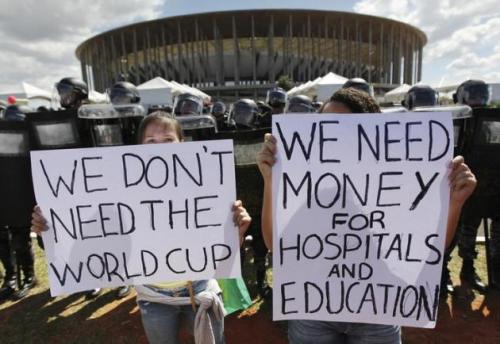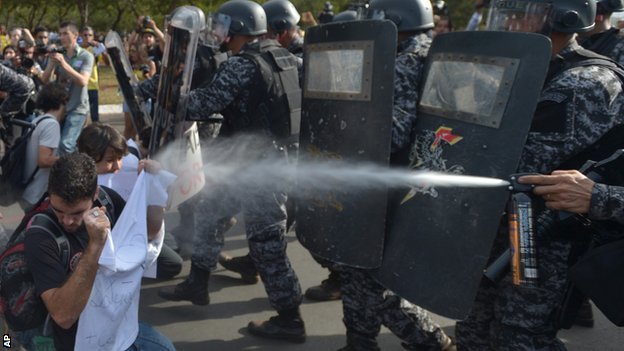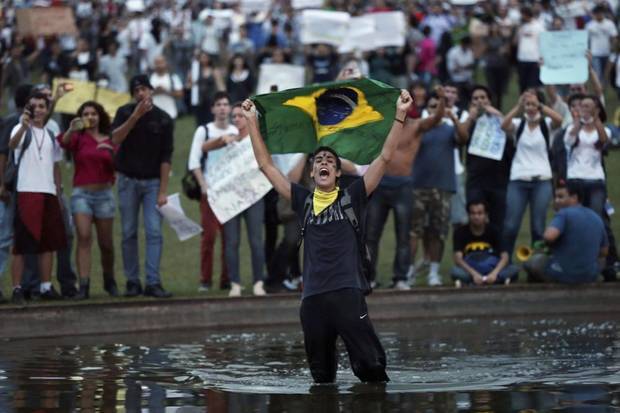Growing up after Sept. 11, 2001, the American media antagonized the Middle East and characterized it as a place were terrorists freely roamed and women were treated worse than animals. I honestly don't know how the media depicts the Middle East these days because I refuse to even listen to them. My class on Middle Eastern Study with Dr. Ferdowsi last year helped me distinguish how the media brainwashed me (even indirectly) about the Middle East and shed light on what it's like there. I like knowing that people are people and every country has problem even if they differ.
Although there are some places in the Middle East that women are treated incredibly poorly, Iran isn't one of them. According to Al Arabiya News, "Iran’s President Hassan Rowhani admitted Sunday that women in his country still face discrimination and cultural barriers but he insisted they are not universally treated as second-class citizens." The report says that his speech is consistent about his ideals of social freedoms, which was one of his cornerstones in his election campaign last year. I don't understand Islamic law fully, but Rowhani said, "Based on the Islamic criteria, we neither consider men as the first sex nor the women as the second sex ... they both have the same human dignity and none is superior," however, the author of the article points out:
And under the Islamic sharia law practiced in Iran, a woman’s evidence is considered to have only half the value of a man’s, which Amnesty International says leads to discrimination in divorce proceedings, child custody disputes and inheritance.
Even in the US, we still have issues over women's rights, so it'd be completely unfair for me to say we live in a completely progressive society, but we are not completely burned by religion like Islamic Law. Islamic Law seems to be a fickle thing.
Side note: Up until last year, I had no idea that Farsi was synonymous with Persian. Thank you, Dr. Ferdowsi, for teaching me such a simple thing.
http://english.alarabiya.net/en/News/2014/04/20/Rowhani-says-Iran-s-women-not-second-class-citizens-.html
Tuesday, April 22, 2014
Nigerian School Girls
First, news reporters said that 130 Nigerian school girls were kidnapped but a new figure this week says that 230 school girls were kidnapped and 52 of them have escaped. State officials were the ones to decrease the official number of victims. The confusion was brought upon the military but they withdrew their statement. Why so much confusion and miscommunication over how many school girls were kidnapped?
BBC stated, "Islamist group Boko Haram is suspected to be behind the kidnapping but has not issued any statement." Boko Haram has been linked to over 1,500 deaths in Nigeria this year.
Although the news report is heartbreaking, the worst part is, "It is thought that the militants took the girls to the Sambisa forest near the Cameroonian border. Parents and vigilante group have gone there to help search for the teenage girls." Does the Nigerian government not care about a few hundred school girls, aged 16-18, being kidnapped supposedly by terrorist groups? Perhaps this is a clear insight to their politically unstable and corrupt government.
http://www.bbc.com/news/world-africa-27101714
BBC stated, "Islamist group Boko Haram is suspected to be behind the kidnapping but has not issued any statement." Boko Haram has been linked to over 1,500 deaths in Nigeria this year.
Although the news report is heartbreaking, the worst part is, "It is thought that the militants took the girls to the Sambisa forest near the Cameroonian border. Parents and vigilante group have gone there to help search for the teenage girls." Does the Nigerian government not care about a few hundred school girls, aged 16-18, being kidnapped supposedly by terrorist groups? Perhaps this is a clear insight to their politically unstable and corrupt government.
http://www.bbc.com/news/world-africa-27101714
Monday, April 7, 2014
Unrest over FIFA in Brazil
Here's a comparison of GDP per capitas and their rankings according to the CIA Factbook (2013):
228. Congo: $400
105. Brazil: $12,100
13. U.S.: $52,800
1. Qatar: $102,100
Technically, San Marino was the lowest ranking on the list, but it was for specific reasons that aren't important to this post. Congo has the second lowest GDP of the 229 countries listed on the CIA Factbook. Brazil's GDP per capita falls in the upper 50% of this list and their GDP is slowly continuing to grow.
Despite the increase of income to Brazil, its citizens are unhappy. They see their government spending millions of dollars on the upcoming FIFA World Cup 2014, but they ask themselves, "Where was this money when I was and am still suffering from poverty?"
Here are a few facts:
228. Congo: $400
105. Brazil: $12,100
13. U.S.: $52,800
1. Qatar: $102,100
Technically, San Marino was the lowest ranking on the list, but it was for specific reasons that aren't important to this post. Congo has the second lowest GDP of the 229 countries listed on the CIA Factbook. Brazil's GDP per capita falls in the upper 50% of this list and their GDP is slowly continuing to grow.
Despite the increase of income to Brazil, its citizens are unhappy. They see their government spending millions of dollars on the upcoming FIFA World Cup 2014, but they ask themselves, "Where was this money when I was and am still suffering from poverty?"
Here are a few facts:
There are 12 host cities with ambitious infrastructure plans (such as fast railway systems airport terminals, etc), but the building projects are being plagued by riots and protests by the citizens. Expecting around 200,000 visitors for the event, the organizers' intention was to boost the economy with tourism and business amongst the regions, however they've been met with opposition. The protesters are trying to delay the World Cup, soccer's biggest tournament, from happening. NPR focuses on Mato Grosso, Cuiaba's capital and one of the host cities:
I think Brazil, not just Mato Grosso, she says, was not ready for the World Cup. Mato Grosso will be penalized because of the World Cup due to the bad management of the government, which has no spending priorities, she says. It will leave a legacy of debt (NPR).
There are only 65 days left until the the FIFA World Cup (June 12, 2014).
Protesters in Rio Janeiro, June 2013
http://www.aljazeera.com/programmes/viewfinder/latinamerica2014/2014/04/occupying-brazil-201446121644533111.html
http://www.npr.org/2014/03/04/285840280/world-cup-woes-loom-for-one-brazilian-city
Subscribe to:
Comments (Atom)



